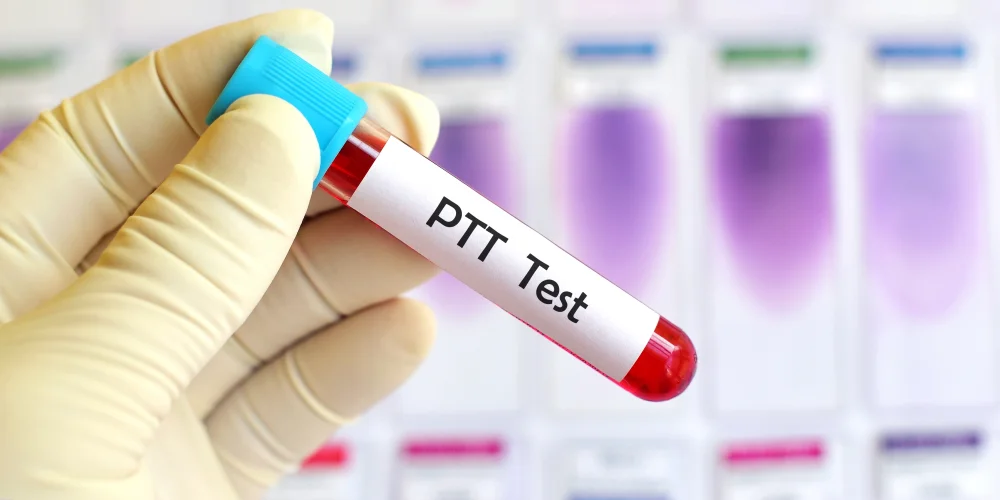Partial Thromboplastin Time Test
Accurate Evaluation of Blood Clotting Function
The Partial Thromboplastin Time (PTT) Test is an essential diagnostic tool used to assess blood clotting ability. By measuring how quickly blood clots, this test assesses various clotting factors. As such, this tool is invaluable in diagnosing bleeding disorders, monitoring patients taking anticoagulant therapies, evaluating overall clotting function to manage conditions properly, as well as monitoring patients for bleeding disorders or anticoagulant therapies.

When is a PTT Test Prescribed?
The PTT Test is often prescribed in various circumstances, including when patients exhibit symptoms of abnormal bleeding or clotting, such as frequent nosebleeds, unexplained bruising, or prolonged bleeding after injury or surgery. Furthermore, it plays an integral part in anticoagulant therapy monitoring (heparin use in particular), to ensure their dosage remains within an appropriate therapeutic range. Furthermore, it plays an invaluable role in diagnosing clotting disorders like hemophilia or lupus anticoagulant syndrome – providing vital insights for effective management or treatment plans and management measures.
Preparation for the PTT Test
No special preparation is necessary to undergo the PTT Test; patients may consume and drink as usual prior to testing. It is, however, essential that patients inform their healthcare provider if any medications or supplements they take may affect the test results and could affect accurate test outcomes. Your physician may provide specific instructions if changes need to be made to ensure accurate results from testing.
Parameters Considered during PTT Test
The PTT Test measures how long it takes blood to clot by assessing various clotting factors and their functionality. A key measure in the PTT Test is partial thromboplastin time – how long it takes after adding a reagent for blood to form a clot and be measured as seconds compared to normal range values to determine any abnormalities or potential abnormalities in this regard. These measurements offer essential insights into your blood’s clotting function that allow doctors to effectively diagnose and manage bleeding disorders like effectively.
Time Required for PTT Test Report
PTT Tests are quick procedures, typically taking only minutes to collect blood samples for analysis in a laboratory. Results typically become available within several hours to 24 hours depending on lab workload allowing timely adjustments to anticoagulant therapy or further diagnostic testing to ensure prompt and effective patient care.
PTT Test Price
Our Partial Thromboplastin Time (PTT) Test can be purchased for just Rs550 and provides essential insight into your blood’s clotting ability, helping in the diagnosis and management of various conditions without incurring excessive financial costs. This cost-effective test gives essential information about its clotting properties which provides essential medical treatment without additional financial pressures being placed upon you.
Make an Appointment for PTT Test
Scheduling your PTT Test at Chirayu SuperSpeciality Hospital is quick and straightforward. You can easily book it online through our website or contact our team directly. Our dedicated staff at the pathology lab in Bhayandar is committed to providing prompt and professional services to efficiently and effectively meet all of your healthcare needs.
What Our Patients Say
Hear from our valued patients about their experiences at Chirayu Super Speciality Hospital and how our care has made a positive impact on their health and well-being.


Very satisfied with the professional and quick service for my PTT test.


The staff explained the procedure well. Received my results without any issues.


I trust Chirayu SuperSpeciality Hospital for all my lab tests. Great experience with the PTT test.


Booking an appointment was hassle-free. Excellent service and timely results.


The staff was very professional and made the test process smooth and easy.


Efficient and reliable PTT test services. Received my results quickly and accurately.
Frequently Asked Questions
Here, we provide answers to some of the most commonly asked questions to help you better understand our services, policies, and facilities. If you have any additional questions, please do not hesitate to contact us.
The PTT Test measures the time it takes for blood to clot, assessing the functionality of various clotting factors.
The PTT Test is necessary to diagnose bleeding or clotting disorders, monitor anticoagulant therapy, and evaluate overall clotting function.
No special preparation, such as fasting, is required for the PTT Test. However, inform your doctor about any medications you are taking.
A blood sample is taken from a vein in your arm and analyzed in a laboratory to measure the clotting time.
PTT Test results are usually available within a few hours to 24 hours, depending on the laboratory’s workload.